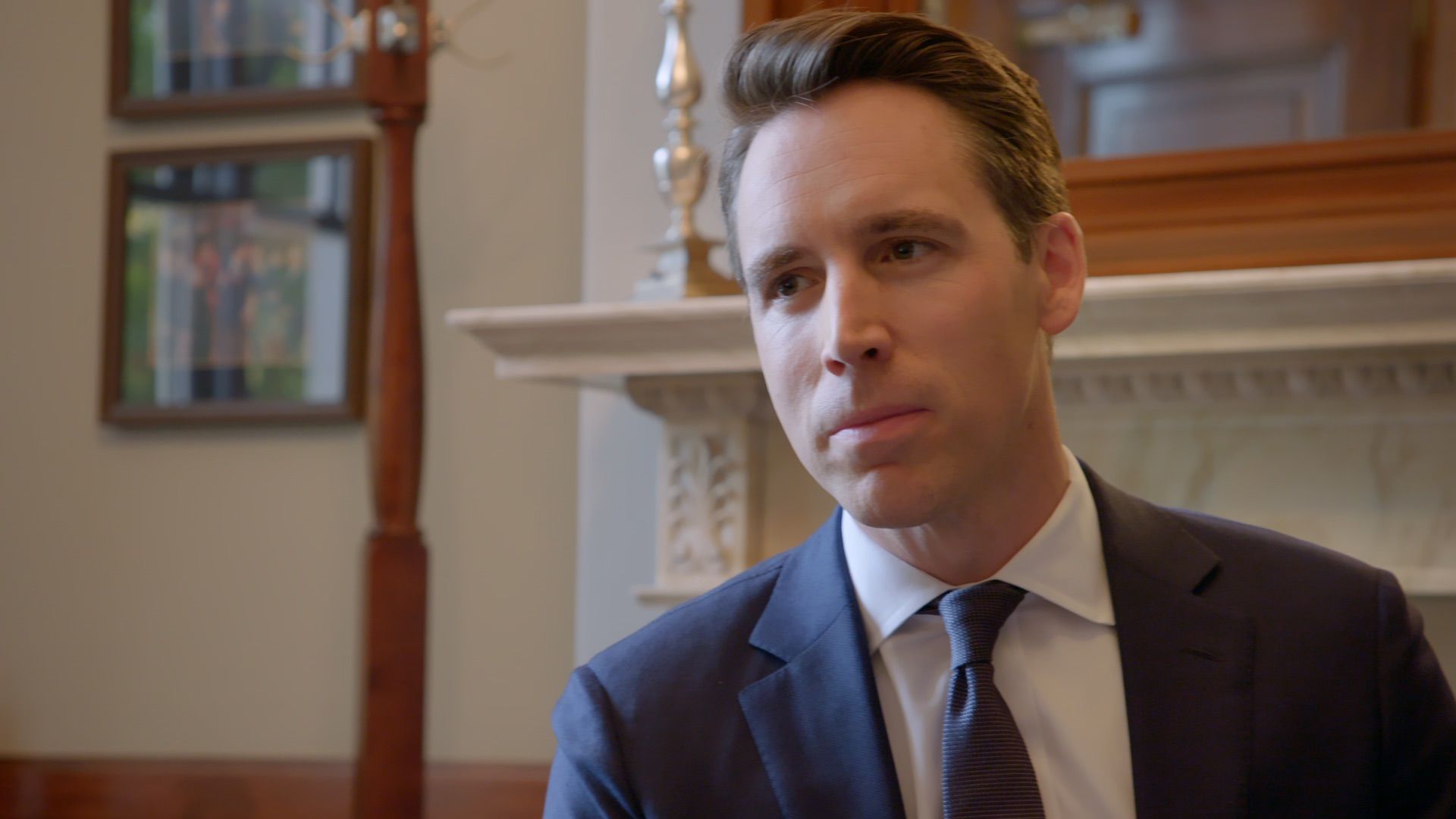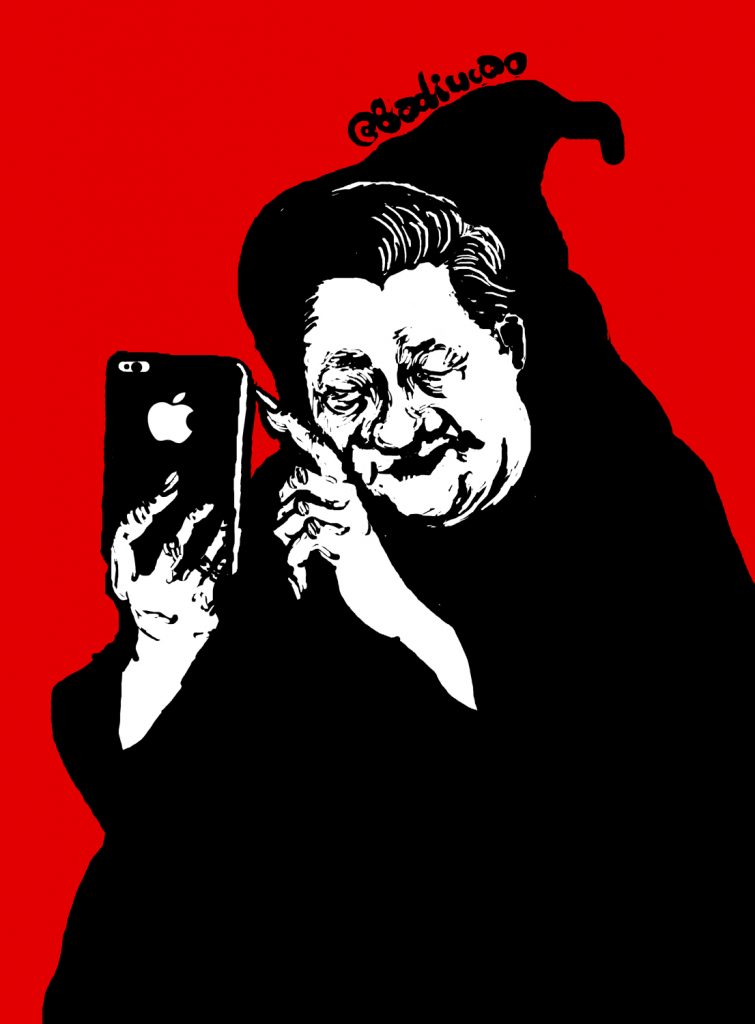By Kim Hart

Senator Josh Hawley.
Sen. Josh Hawley says Apple and TikTok are threatening U.S. national security through their Chinese operations and connections.
In an exclusive interview with "Axios on HBO," the Missouri Republican called out Apple for choosing Chinese profits over American values.
He also called on TikTok, owned by Beijing-based ByteDance, to testify under oath that it does not share American data with China's Communist Party.
Why it matters: On Tuesday, Hawley will chair a hearing highlighting the compromises that, he argues, U.S. tech companies make to do business in China.
Why it matters: On Tuesday, Hawley will chair a hearing highlighting the compromises that, he argues, U.S. tech companies make to do business in China.
The hearing comes amid increasing tensions over trade and technology transfers between the U.S. and China.
Hawley invited Apple and TikTok executives to testify at Tuesday's hearing, called “How Corporations and Big Tech Leave Our Data Exposed to Criminals, China, and Other Bad Actors.”
The companies declined to appear, as of Sunday.
Hawley invited Apple and TikTok executives to testify at Tuesday's hearing, called “How Corporations and Big Tech Leave Our Data Exposed to Criminals, China, and Other Bad Actors.”
The companies declined to appear, as of Sunday.
The subcommittee will have open chairs for them during the hearing.
Hawley said he has two primary concerns:
American tech companies making deals with China's government to do business there.
China-based tech companies that are growing rapidly in America and collecting U.S. consumer data in the process.
"[As] these Big Tech companies try to get into the Chinese market, the compromises that they have to make with the Communist Chinese Party — who, let's not forget, partner with or control every industry of any size in China — what does that do to American security?" Hawley told "Axios on HBO."
The big picture: Hawley, who chairs the Senate Judiciary crime and terrorism subcommittee, is one of the most vocal Republican critics of Silicon Valley in Congress.
Lawmakers are already skeptical of TikTok's ties to China.
Hawley said he has two primary concerns:
American tech companies making deals with China's government to do business there.
China-based tech companies that are growing rapidly in America and collecting U.S. consumer data in the process.
"[As] these Big Tech companies try to get into the Chinese market, the compromises that they have to make with the Communist Chinese Party — who, let's not forget, partner with or control every industry of any size in China — what does that do to American security?" Hawley told "Axios on HBO."
The big picture: Hawley, who chairs the Senate Judiciary crime and terrorism subcommittee, is one of the most vocal Republican critics of Silicon Valley in Congress.
Lawmakers are already skeptical of TikTok's ties to China.
Last week, Sens. Chuck Schumer (D-N.Y.) and Tom Cotton (R-Ark.) asked for a national security review of the platform.
On Friday, Reuters reported the U.S. government has opened a national security investigation into TikTok owner's acquisition of social media app Musical.ly two years ago.
The other side: TikTok, which is very popular among teenagers, has said all U.S. user data is stored in the U.S., with a backup server in Singapore.
On Friday, Reuters reported the U.S. government has opened a national security investigation into TikTok owner's acquisition of social media app Musical.ly two years ago.
The other side: TikTok, which is very popular among teenagers, has said all U.S. user data is stored in the U.S., with a backup server in Singapore.
That doesn't ease Hawley's concerns.
"I would say that doesn't necessarily mean that the communist government doesn't have access to the data," he said.
"I would say that doesn't necessarily mean that the communist government doesn't have access to the data," he said.
"I don't know that it matters where the data is stored for that kind of a company. I think you've got to assume that there is a backdoor way into that data."
He added that TikTok is a company people don't know much about.
He added that TikTok is a company people don't know much about.
"Maybe it's growing in popularity, but what exactly does that company do? What's happening to our data when we use the app? Americans deserve answers."
A TikTok spokesperson said in a statement provided to Axios that the company appreciates the invitation to the hearing.
A TikTok spokesperson said in a statement provided to Axios that the company appreciates the invitation to the hearing.
"Unfortunately, on short notice, we were unable to provide a witness who would be able to contribute to a substantive discussion."
"We remain committed to working productively with Congress as it looks at how to secure the data of American users, protect their privacy, promote free expression, ensure competition and choice among internet platforms, and preserve U.S. national security interests," the spokesperson continued.
"We remain committed to working productively with Congress as it looks at how to secure the data of American users, protect their privacy, promote free expression, ensure competition and choice among internet platforms, and preserve U.S. national security interests," the spokesperson continued.
Apple, for its part, has said it uses encryption across devices and servers in all countries and insists there are no backdoors into data centers or systems.
When asked about these security practices, Hawley wasn't comforted.
"My question is, are they storing encryption keys in China? The answer to that is yes. Then what kind of data are they storing in China? Whose data? Any American data? What about people who have Chinese relatives or business partners or other ventures, so they're communicating with people in China? Does that expose American users to potential surveillance by the Chinese state?"
Apple declined to comment on this story.
"My question is, are they storing encryption keys in China? The answer to that is yes. Then what kind of data are they storing in China? Whose data? Any American data? What about people who have Chinese relatives or business partners or other ventures, so they're communicating with people in China? Does that expose American users to potential surveillance by the Chinese state?"
Apple declined to comment on this story.
However, it previously said that Apple — not its Chinese partner — retains control over encryption keys to iCloud data stored there.
Hawley said Silicon Valley needs to make a stand against China.
"They're willing to trade our basic democratic values and the privacy and security of Americans in order to make a buck in China and to get the favor of the Beijing government."
The bottom line: Hawley said his concern is that "the Communist Party could be scooping up" troves of data from the U.S. teenagers using TikTok and Apple products and apps.
"Think about what it will mean in 20 years when there's that much more data on them. Think about the profiles that American companies, [and] Chinese companies connected to the Communist Party, could build on people who are today just in their teens. I mean, these are the things that as a parent with two small children at home, I worry about every day."
Hawley said Silicon Valley needs to make a stand against China.
"They're willing to trade our basic democratic values and the privacy and security of Americans in order to make a buck in China and to get the favor of the Beijing government."
The bottom line: Hawley said his concern is that "the Communist Party could be scooping up" troves of data from the U.S. teenagers using TikTok and Apple products and apps.
"Think about what it will mean in 20 years when there's that much more data on them. Think about the profiles that American companies, [and] Chinese companies connected to the Communist Party, could build on people who are today just in their teens. I mean, these are the things that as a parent with two small children at home, I worry about every day."
— Josh Hawley

Aucun commentaire:
Enregistrer un commentaire